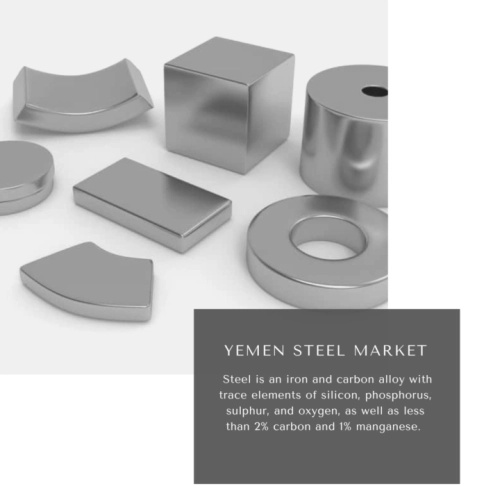
- Get in Touch with Us

Last Updated: Apr 25, 2025 | Study Period: 2024-2030
Steel is an iron and carbon alloy with trace elements of silicon, phosphorus, sulphur, and oxygen, as well as less than 2% carbon and 1% manganese. The most important material used in engineering and building worldwide is steel. Other elements such as nickel, molybdenum, manganese, titanium, boron, cobalt, or vanadium may also be present in steel.

The Yemen Steel market accounted for $XX Billion in 2023 and is anticipated to reach $XX Billion by 2030, registering a CAGR of XX% from 2024 to 2030.
Given that Yemen is a remarkable consumer market, a fact that has been highlighted by the rising rate of productivity in the private industrial sectors over the past ten years. As a result, a wide range of other economic sectors will be included in the national productivity rate, which is expected to accelerate at a rapid rate.
YEMEN STEEL's goals include expanding production lines to produce a wider range of steel products, including Equal Angles, Flat & Square Bars, Galvanised Pipes, Square Tubes, Expanded Metal, GI Corrugated Sheets, Cut to Length Sheets, GI, HRC, and others that are currently the subject of ongoing research.
East of Yemen, in Mukalla, the capital of the Hadramout Governorate, the Al-Mukalla Iron and Steel Factory "misc" has been shut down.
The cost of fuel to run the iron and steel plant in Mukalla was prohibitive, and the local government required the Bajarsh Electricity Company to supply electricity to other areas at the expense of the electrical energy designated for the plant's operation.
This forced the factory management to pay the workers' two-month salaries as well as the costs of the factory's operating expenses, subjecting the factory to a cumulative loss.
| Sl no | Topic |
| 1 | Market Segmentation |
| 2 | Scope of the report |
| 3 | Abbreviations |
| 4 | Research Methodology |
| 5 | Executive Summary |
| 6 | Introduction |
| 7 | Insights from Industry stakeholders |
| 8 | Cost breakdown of Product by sub-components and average profit margin |
| 9 | Disruptive innovation in the Industry |
| 10 | Technology trends in the Industry |
| 11 | Consumer trends in the industry |
| 12 | Recent Production Milestones |
| 13 | Component Manufacturing in US, EU and China |
| 14 | COVID-19 impact on overall market |
| 15 | COVID-19 impact on Production of components |
| 16 | COVID-19 impact on Point of sale |
| 17 | Market Segmentation, Dynamics and Forecast by Geography, 2024-2030 |
| 18 | Market Segmentation, Dynamics and Forecast by Product Type, 2024-2030 |
| 19 | Market Segmentation, Dynamics and Forecast by Application, 2024-2030 |
| 20 | Market Segmentation, Dynamics and Forecast by End use, 2024-2030 |
| 21 | Product installation rate by OEM, 2023 |
| 22 | Incline/Decline in Average B-2-B selling price in past 5 years |
| 23 | Competition from substitute products |
| 24 | Gross margin and average profitability of suppliers |
| 25 | New product development in past 12 months |
| 26 | M&A in past 12 months |
| 27 | Growth strategy of leading players |
| 28 | Market share of vendors, 2023 |
| 29 | Company Profiles |
| 30 | Unmet needs and opportunity for new suppliers |
| 31 | Conclusion |
| 32 | Appendix |